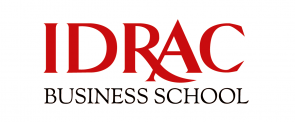About International Development in IDRAC Business School
OBJECTIVES
This program aims at preparing students for a career in international business, first as business developers, then export managers. To train future business developers, the program enhances students capabilities to design strategies for world markets, gives them hands on experience of the sales and marketing tools to implement these strategies, and finally develops their prospection, networking and negotiation skills through consulting missions and international negotiation trainings. Through this program, students also acquire skills essential to manage an export department, ie structure a supply chain , cover major financial risks associated to international business and manage a sales team.
SKILLS
- Develop a global vision of markets and market expansion strategies.
- Master foreign market entry and market development processes.
- Acquire business development skills.
- Acquire export management skills.
Races
Designing international business development strategies
- International Business Development Strategy
- International Channel Management
Implementing business development strategies
- International BtoB Marketing Plan
- International Sales Plan
- Cooperation contracts
Acquiring business development skills
- International Prospecting Techniques
- International Negotiation Techniques
Acquiring export management skills
- International Transportation Strategy
- Financial Risk Management in International Business
- International Sales Team Management
International careers
- Area Sales Manager
- Business Developer
- Key Account Manager
- International Product Manager
- International Project Manager
- International Events Manager (trade fairs, conferences…)
Academic qualification equivalents
English language requirements (one of the below):
The tuition fees and expenses at IDRAC Business School in France can vary depending on several factors, including the program of study, the campus location, and the student's nationality. Please note that these figures are approximate and may have changed since my last knowledge update in September 2021. It's essential to verify the most up-to-date information on the school's official website or by contacting the admissions office.
1. Tuition Fees:
Tuition fees at IDRAC Business School in France can vary based on the program and campus. Here's a rough estimate of the annual tuition fees for international students:
- Bachelor's Programs (BBA): Tuition fees for undergraduate programs typically range from approximately €8,000 to €12,000 per year.
- Master's Programs (MBA): Tuition fees for master's programs can vary widely based on the specialization and location. On average, they may range from €10,000 to €16,000 per year.
- Doctor of Business Administration (DBA): The tuition fees for DBA programs tend to be higher, often exceeding €20,000 per year.
It's important to note that some programs may have additional fees for study materials, books, and administrative expenses. Additionally, scholarships and financial aid opportunities may be available to eligible students, so it's advisable to check with the school's financial aid office for details.
2. Living Expenses:
The cost of living in France can vary significantly depending on the city and lifestyle of the student. Major cities like Paris tend to be more expensive than smaller cities. On average, international students can expect to incur the following monthly expenses:
- Accommodation: Rent for student accommodation in France can range from €300 to €800 or more per month, depending on whether you choose to live in university housing, private apartments, or shared accommodations.
- Food: Food expenses can vary, but a rough estimate for monthly groceries and meals at local restaurants is around €200 to €400.
- Transportation: Public transportation costs can vary by city but are typically between €30 to €70 per month.
- Health Insurance: International students are usually required to have health insurance. The cost varies, but it's approximately €200 to €600 per year.
- Miscellaneous: This category includes expenses for mobile phone plans, internet, books, and other personal items. It may amount to around €100 to €200 per month.
3. Visa and Residence Permit:
International students from outside the European Union (EU) and European Economic Area (EEA) may need to obtain a student visa and a residence permit, which may involve additional fees. The cost of visa and permit processing can vary based on nationality and specific requirements.
Please keep in mind that these figures are rough estimates, and actual expenses may vary based on individual circumstances. It's essential to research the specific program you're interested in and contact IDRAC Business School directly for the most accurate and up-to-date information on tuition fees and living expenses. Additionally, consider budgeting for potential fluctuations in currency exchange rates and unexpected expenses.
